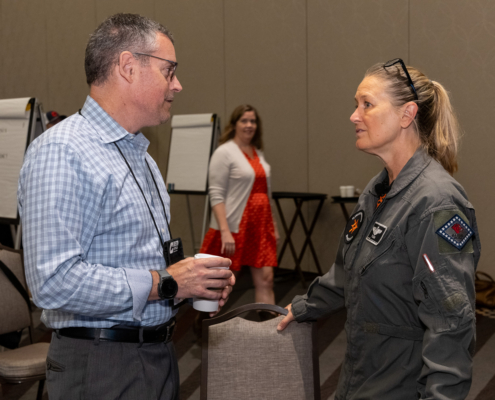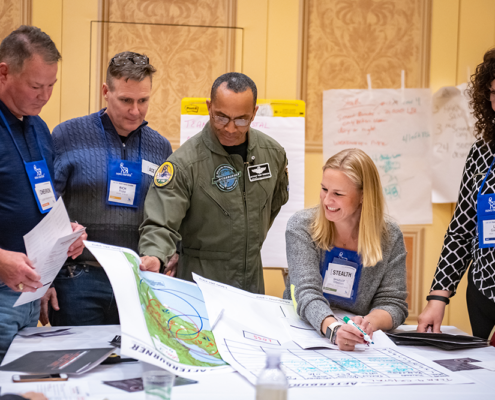 https://www.afterburner.com/wp-content/uploads/2024/11/High-Impact-Leader-Crete2024Summit-677-scaled.jpg
1707
2560
Ansley Anchors
/wp-content/uploads/2024/07/Afterburner-Logo-Resize-Fullcolor-300x93.png
Ansley Anchors2024-11-05 10:52:592024-11-20 14:55:53The Top 5 Attributes of a High-Impact Leader
https://www.afterburner.com/wp-content/uploads/2024/11/High-Impact-Leader-Crete2024Summit-677-scaled.jpg
1707
2560
Ansley Anchors
/wp-content/uploads/2024/07/Afterburner-Logo-Resize-Fullcolor-300x93.png
Ansley Anchors2024-11-05 10:52:592024-11-20 14:55:53The Top 5 Attributes of a High-Impact Leader
I recently read a good book on how organizations can learn, innovate, and compete called “Teaming” by Amy C. Edmondson. I’m also sure most of you have read this book and agree that the insights provided are valuable. But – how many books have we all read that really don’t necessarily cover “HOW” to accomplish or implement the theory being presented? For me, it’s quite common to read something that doesn’t actually provide the steps required for building high performance teams.
Here are three simple tips from my (since departed) military world that will help you in building high performance teams:
1) To build a team that continues to grow, learn, and adapt – we must implement some form of a Debrief. Your teams will not learn from their mistakes or continue to repeat successes without some type of a Debrief. Make sure to Debrief after EVERY project or Mission Objective completed. If you implement only one thing from this post, this would be it and that’s why I put it at number one!
2) Execute in a nimble, agile manner! During execution, a lot of teams get caught up the act of execution, keeping their heads down and never coming up for air. This means they do not meet regularly or set any type of execution rhythm to assess the completed action items or reassess the battle space. The battle space can change daily – why would we not assess, adapt, and adjust during execution? This is a common mistake I see out in the business world. Make sure to set a tempo or cadence during execution!
3) COMMUNICATE! How many consultants does it take to say this on a daily basis? I joke, but it’s true. Then how do we communicate better, Jake? One simple way to effectively align your team, create mindfulness, and foster team clarity is to conduct some sort of briefing before your team begins executing any sort of project or mission. Follow a repeatable format to brief your team each and every time BEFORE execution to communicate the: why, what, and how! You’d be surprised how many blank stares you can get when you ask a teammate during execution: “what’s your mission?” or, “what’s your action items for XYZ project?” if you don’t brief the team!
I hope these three simple tips can help you on your journey to build elite, high-performing teams!
Share This Post
More Like This
 https://www.afterburner.com/wp-content/uploads/2024/11/High-Impact-Leader-Crete2024Summit-677-scaled.jpg
1707
2560
Ansley Anchors
/wp-content/uploads/2024/07/Afterburner-Logo-Resize-Fullcolor-300x93.png
Ansley Anchors2024-11-05 10:52:592024-11-20 14:55:53The Top 5 Attributes of a High-Impact Leader
https://www.afterburner.com/wp-content/uploads/2024/11/High-Impact-Leader-Crete2024Summit-677-scaled.jpg
1707
2560
Ansley Anchors
/wp-content/uploads/2024/07/Afterburner-Logo-Resize-Fullcolor-300x93.png
Ansley Anchors2024-11-05 10:52:592024-11-20 14:55:53The Top 5 Attributes of a High-Impact Leader https://www.afterburner.com/wp-content/uploads/2024/09/fighter-jet-performing-quick-ariel-maneuver.jpeg
1280
1920
Nate Riggins
/wp-content/uploads/2024/07/Afterburner-Logo-Resize-Fullcolor-300x93.png
Nate Riggins2024-01-02 19:53:032024-11-20 14:55:544 Ways to Boost Your Team’s Morale and Hit Your Revenue Targets
https://www.afterburner.com/wp-content/uploads/2024/09/fighter-jet-performing-quick-ariel-maneuver.jpeg
1280
1920
Nate Riggins
/wp-content/uploads/2024/07/Afterburner-Logo-Resize-Fullcolor-300x93.png
Nate Riggins2024-01-02 19:53:032024-11-20 14:55:544 Ways to Boost Your Team’s Morale and Hit Your Revenue Targets https://www.afterburner.com/wp-content/uploads/2024/09/Group_Meeting_2-1.jpeg
1707
2560
Nate Riggins
/wp-content/uploads/2024/07/Afterburner-Logo-Resize-Fullcolor-300x93.png
Nate Riggins2024-01-02 18:26:092024-11-20 14:55:54Fueling Business Agility: The Strategic Pivot
https://www.afterburner.com/wp-content/uploads/2024/09/Group_Meeting_2-1.jpeg
1707
2560
Nate Riggins
/wp-content/uploads/2024/07/Afterburner-Logo-Resize-Fullcolor-300x93.png
Nate Riggins2024-01-02 18:26:092024-11-20 14:55:54Fueling Business Agility: The Strategic Pivot https://www.afterburner.com/wp-content/uploads/2024/09/airborn-fighter-jet-using-afterburners-1.jpeg
1080
1920
Nate Riggins
/wp-content/uploads/2024/07/Afterburner-Logo-Resize-Fullcolor-300x93.png
Nate Riggins2024-01-02 18:19:252024-11-20 14:55:55Combat Distractions and Boost Your Revenue – Fighter Pilot-Style
https://www.afterburner.com/wp-content/uploads/2024/09/airborn-fighter-jet-using-afterburners-1.jpeg
1080
1920
Nate Riggins
/wp-content/uploads/2024/07/Afterburner-Logo-Resize-Fullcolor-300x93.png
Nate Riggins2024-01-02 18:19:252024-11-20 14:55:55Combat Distractions and Boost Your Revenue – Fighter Pilot-Style https://www.afterburner.com/wp-content/uploads/2024/09/jamie-street-_94HLr_QXo8-unsplash-1.jpeg
1380
2048
Nate Riggins
/wp-content/uploads/2024/07/Afterburner-Logo-Resize-Fullcolor-300x93.png
Nate Riggins2024-01-02 15:02:302024-11-20 14:55:553 Steps New Leaders Must Include in Their Strategic Planning Process
https://www.afterburner.com/wp-content/uploads/2024/09/jamie-street-_94HLr_QXo8-unsplash-1.jpeg
1380
2048
Nate Riggins
/wp-content/uploads/2024/07/Afterburner-Logo-Resize-Fullcolor-300x93.png
Nate Riggins2024-01-02 15:02:302024-11-20 14:55:553 Steps New Leaders Must Include in Their Strategic Planning Process https://www.afterburner.com/wp-content/uploads/2024/09/team-looking-at-map-to-focus-on-improving-teamwork-in-the-workplace-1.png
667
1000
Nate Riggins
/wp-content/uploads/2024/07/Afterburner-Logo-Resize-Fullcolor-300x93.png
Nate Riggins2024-01-02 03:00:272024-11-20 14:55:554 Tips for Improving Teamwork in the Workplace
https://www.afterburner.com/wp-content/uploads/2024/09/team-looking-at-map-to-focus-on-improving-teamwork-in-the-workplace-1.png
667
1000
Nate Riggins
/wp-content/uploads/2024/07/Afterburner-Logo-Resize-Fullcolor-300x93.png
Nate Riggins2024-01-02 03:00:272024-11-20 14:55:554 Tips for Improving Teamwork in the Workplace https://www.afterburner.com/wp-content/uploads/2024/09/planning-1.jpeg
933
1400
Nate Riggins
/wp-content/uploads/2024/07/Afterburner-Logo-Resize-Fullcolor-300x93.png
Nate Riggins2023-05-02 20:23:162024-11-20 14:55:58Using Brain Chemistry For Building High-Performance Teams
https://www.afterburner.com/wp-content/uploads/2024/09/planning-1.jpeg
933
1400
Nate Riggins
/wp-content/uploads/2024/07/Afterburner-Logo-Resize-Fullcolor-300x93.png
Nate Riggins2023-05-02 20:23:162024-11-20 14:55:58Using Brain Chemistry For Building High-Performance Teams https://www.afterburner.com/wp-content/uploads/2024/09/afterburner-banner-image-ceo-jim-murphy-giving-a-presentation_crop-1.jpeg
784
1920
Nate Riggins
/wp-content/uploads/2024/07/Afterburner-Logo-Resize-Fullcolor-300x93.png
Nate Riggins2022-11-14 21:30:142024-11-20 14:55:58What If Your Teams Were Truly High Performing?
https://www.afterburner.com/wp-content/uploads/2024/09/afterburner-banner-image-ceo-jim-murphy-giving-a-presentation_crop-1.jpeg
784
1920
Nate Riggins
/wp-content/uploads/2024/07/Afterburner-Logo-Resize-Fullcolor-300x93.png
Nate Riggins2022-11-14 21:30:142024-11-20 14:55:58What If Your Teams Were Truly High Performing?
Top Three Threats to Employee Morale in Today’s Economy
Business Culture, Leadership, Motivation, Team BuildingAbout Us
Building Strong Teams Through the Guidance of Fighter Pilot Keynote Speakers.

